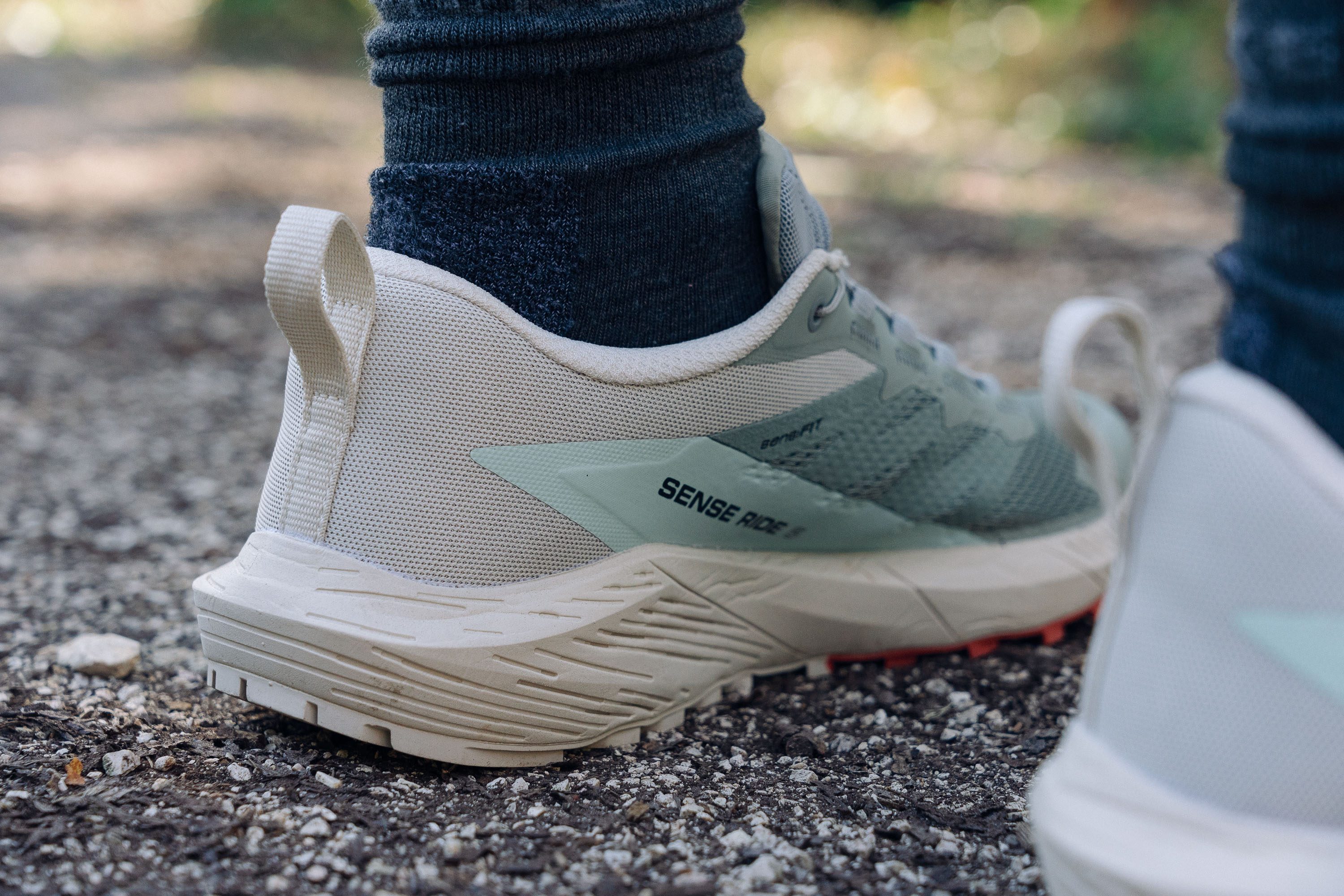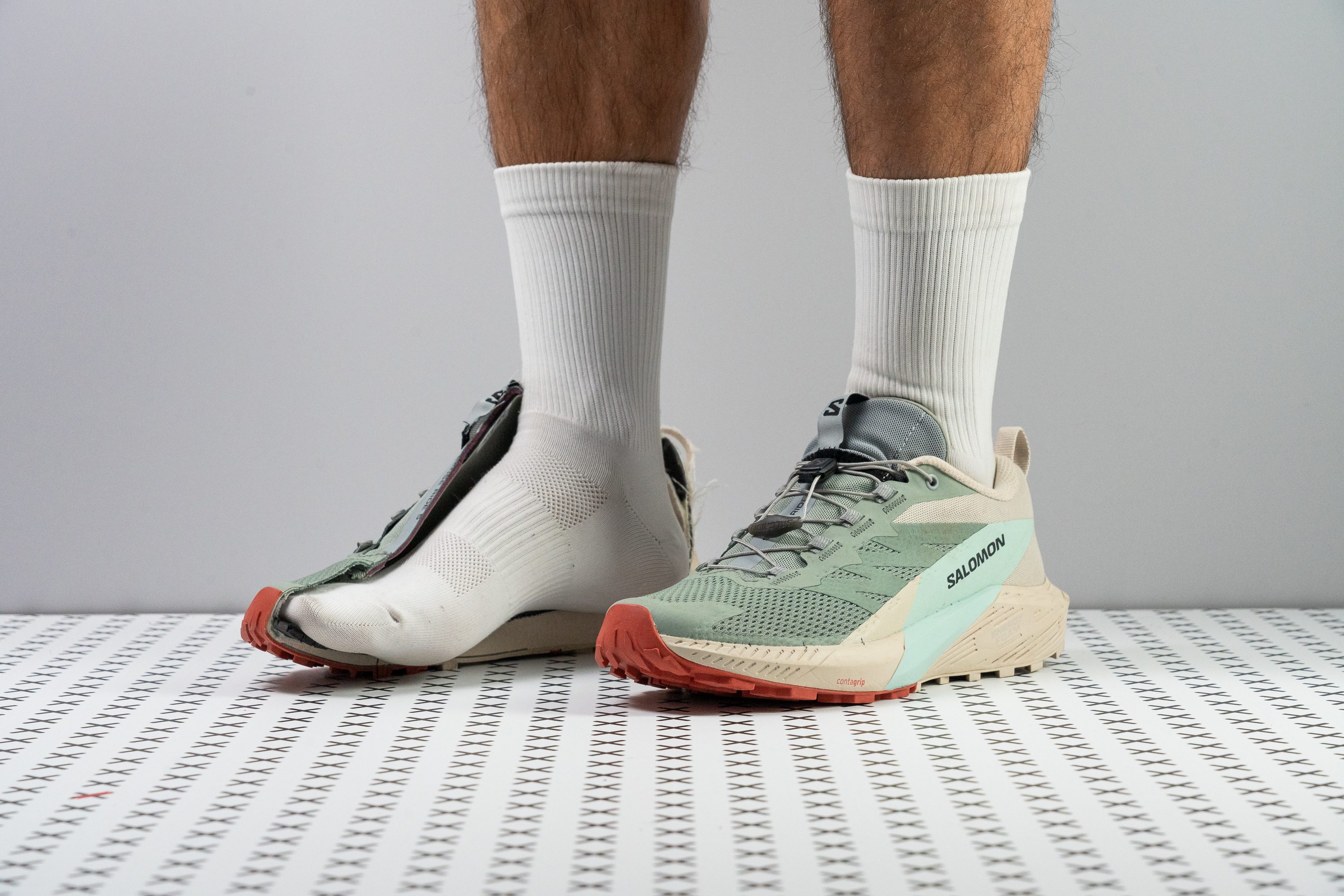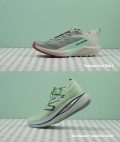Our verdict
- Top pick in best Salomon trail running shoes
- Top pick in best Salomon running shoes
Pros
- Immaculate lockdown
- Plenty of ground feel
- Confident on moderate trails and steep downhills
- Smooth and stable ride
- Can hold its own for speedwork
- Comfy and breathable upper
- Best for daily miles, longer efforts, and even road runs!
Cons
- Forget about hard trails
- Thin under forefoot
- Runs a little bit narrow
Audience verdict
- Top 28% in trail running shoes
- Top 29% in Salomon running shoes
Comparison
The most similar running shoes compared
+ + Add a shoe | |||||
|---|---|---|---|---|---|
| Audience score | 89 Great! | 83 Good! | 87 Great! | 86 Good! | |
| Price | $140 | $155 | $130 | $150 | |
| Trail terrain | LightModerate | Moderate | Light | LightModerate | |
| Shock absorption | Low | - | - | Moderate | |
| Energy return | Moderate | - | - | Moderate | |
| Arch support | Neutral | Neutral | Neutral | Neutral | |
| Weight lab Weight brand | 10.3 oz / 291g 10.3 oz / 291g | 9.6 oz / 271g 9.5 oz / 270g | 9.9 oz / 281g 9.9 oz / 280g | 10.1 oz / 286g 9.2 oz / 260g | |
| Drop lab Drop brand | 8.7 mm 8.3 mm | 8.9 mm 6.0 mm | 7.2 mm 6.0 mm | 7.2 mm 6.0 mm | |
| Strike pattern | HeelMid/forefoot | HeelMid/forefoot | Mid/forefoot | Mid/forefoot | |
| Size | Slightly small | Half size small | True to size | True to size | |
| Midsole softness | Balanced | Soft | Soft | Soft | |
| Difference in midsole softness in cold | Small | Normal | Small | Big | |
| Plate | ✗ | ✗ | Rock plate | ✗ | |
| Toebox durability | - | Very bad | Decent | Bad | |
| Heel padding durability | - | Bad | Good | - | |
| Outsole durability | - | Decent | Good | - | |
| Breathability | Moderate | Moderate | Moderate | Moderate | |
| Width / fit | Medium | Medium | Medium | Narrow | |
| Toebox width | Medium | Medium | Medium | Narrow | |
| Stiffness | Moderate | Stiff | Stiff | Moderate | |
| Torsional rigidity | Moderate | Stiff | Stiff | Flexible | |
| Heel counter stiffness | Flexible | Stiff | Moderate | Moderate | |
| Lug depth | 3.5 mm | 3.4 mm | 2.5 mm | 2.8 mm | |
| Heel stack lab Heel stack brand | 27.2 mm 29.6 mm | 29.3 mm 34.0 mm | 31.0 mm 32.6 mm | 30.6 mm 32.0 mm | |
| Forefoot lab Forefoot brand | 18.5 mm 21.3 mm | 20.4 mm 28.0 mm | 23.8 mm 26.6 mm | 23.4 mm 26.0 mm | |
| Widths available | NarrowNormal | Normal | Normal | Normal | |
| Season | All seasons | All seasons | All seasons | All seasons | |
| Removable insole | ✓ | ✓ | ✓ | ✗ | |
| Orthotic friendly | ✓ | ✓ | ✓ | ✗ | |
| Ranking | #108 Top 29% | #271 Bottom 29% | #148 Top 39% | #181 Top 48% | |
| Popularity | #167 Top 44% | #202 Bottom 47% | #307 Bottom 19% | #208 Bottom 45% |
Cushioning
Shock absorption
If you’re a midfoot or forefoot striker, you’d better enjoy ground feel—the Sense Ride 5’s forefoot measured just 65 SA in our impact dampening test. Conversely, the heel offers more protection at 108 SA, making it a better match for a wider range of runners.
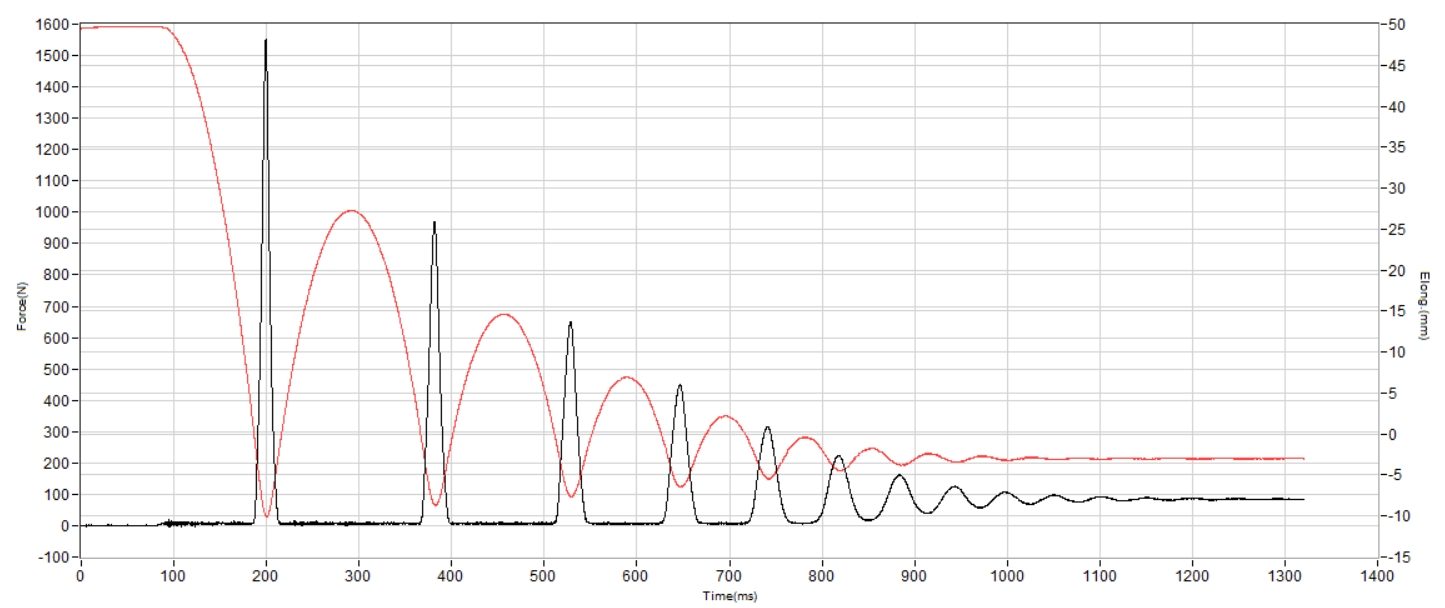
| Sense Ride 5 | 108 SA |
| Average | 122 SA |
Energy return
The Sense Ride 5 is one of the highest-scoring Salomon models we’ve tested lately in terms of energy return, hitting 56.2% in the heel and 60.2% in the forefoot. That’s a solid result for a daily trainer, and it's also better than most Salomon shoes.
| Sense Ride 5 | 56.2% |
| Average | 55.3% |
Size and fit
Size
Salomon Sense Ride 5 fits slightly small (68 votes).
Flexibility / Stiffness
We appreciated the Sense Ride 5's pliable nature, which adapted seamlessly to both our foot movements and the terrain.
As our lab test showed, this Salomon shoe requires a little less force to bend by 30 degrees (12.5N) compared to the average.
| Sense Ride 5 | 12.5N |
| Average | 14.6N |
Who should buy the Sense Ride 5
From our perspective, the Sense Ride 5 is a great option for you if:
- You’re looking for a good road-to-trail hybrid shoe.
- Your usual routes only include a mix of light to moderate trails.
- You need a trail runner that can handle both your everyday runs and the occasional speedwork.
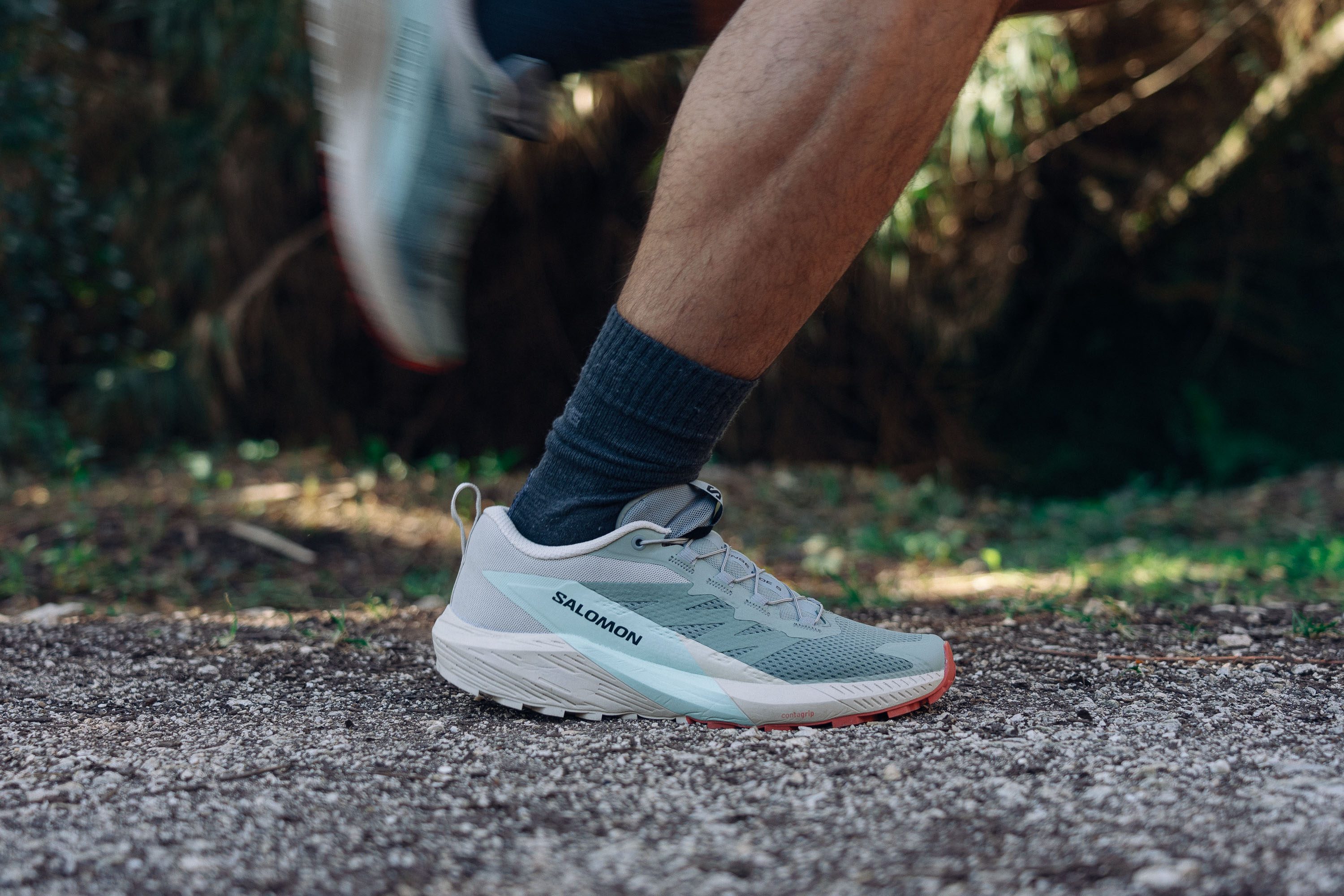
Who should NOT buy
Pure forefoot strikers might find the Sense Ride 5 a bit too uncomfortable, especially on rougher trails, because of its midsole. A good alternative could be the more cushioned Ultra Glide. For those with wider feet, we recommend checking out the Salomon Pulsar Trail, as we found it offers a more accommodating fit.
A solid choice for your summer trails
Most trail running shoes struggle when it comes to breathability. In fact, the average breathability score for road running shoes is 3.8, while the one for trail running shoes is 2.9. That's a 39% difference that's pretty obvious when you run in hot temperatures.
The magnificent upper in the Sense Ride 5 outperforms even most road shoes, as it scored 4 out of 5 in our breathability test.
We put this Salomon hybrid trail/road shoe under our microscope and examined it closely.
The material is weaved less densely around the toe box which ensures good breathability and packed tighter around the heel which keeps it in place.
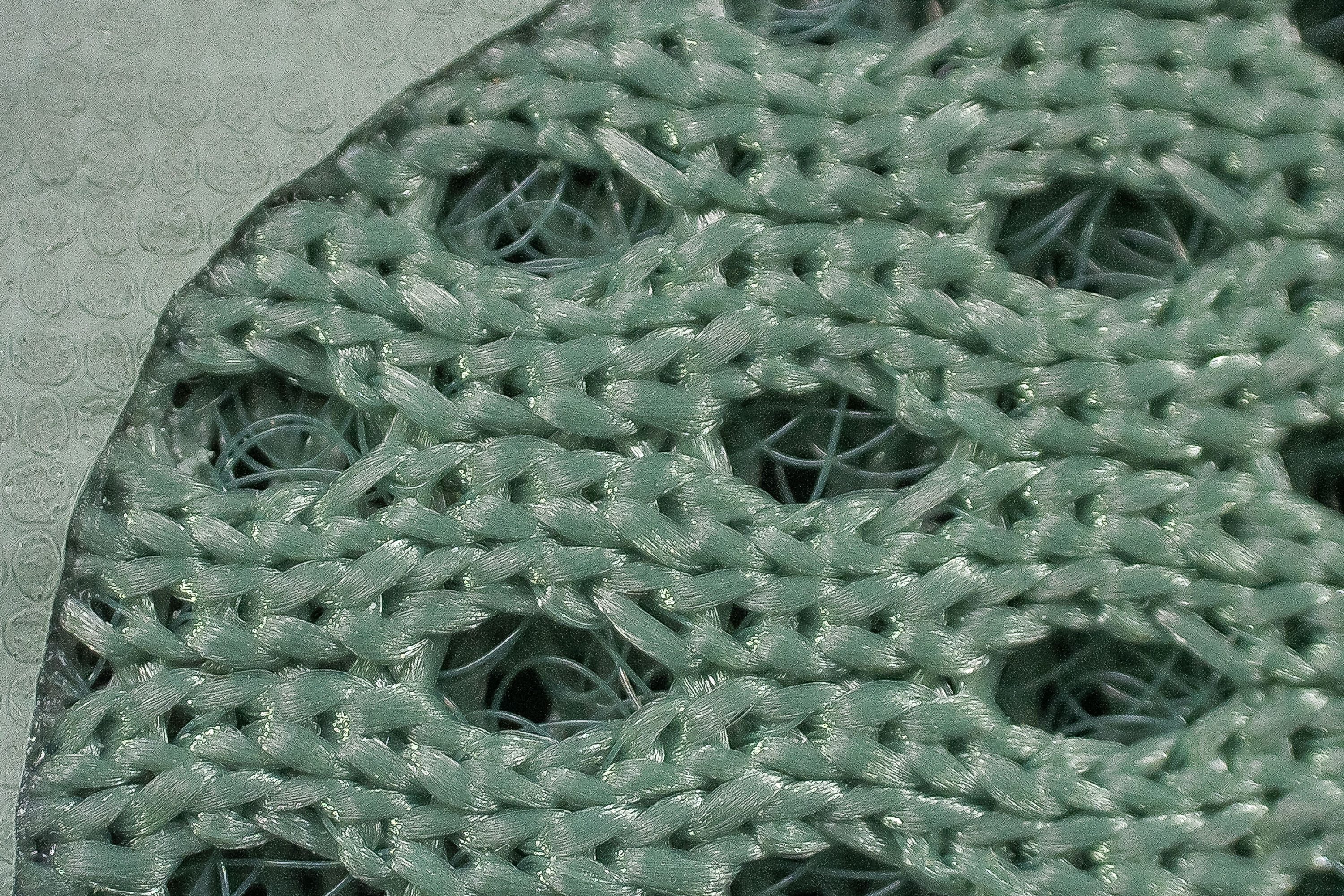
Salomon added tons of holes to improve airflow, even though their mesh isn't the thinnest—but that's okay since it's a trail shoe that needs to be resistant, right?
The Sense Ride 5 has an impeccable upper
In the midfoot, the overlays work in tandem with the shoe’s Sensifit system—which connects the midsole to the upper—providing a snug, secure lockdown. We also took note of the well-padded heel collar and the adequately rigid heel counter which contributed to the shoe’s comfortable step-in feel.
In our heel stiffness test, the SR5 received a score of 2 out of 5 (5 being the stiffest). This means a more flexible and forgiving heel design which is still effective in providing a secure lockdown.
Soft and cold-proof midsole
The Sense Ride 5 abandons its predecessors’ Optivibe cushioning in favor of the newer Energy Foam, which is an EVA + OBC blend that works really well—check our in-depth guide about foams to delve deeper into this topic.
We felt that this setup provided a softer and more protective underfoot feel, making the shoe better for longer distances.
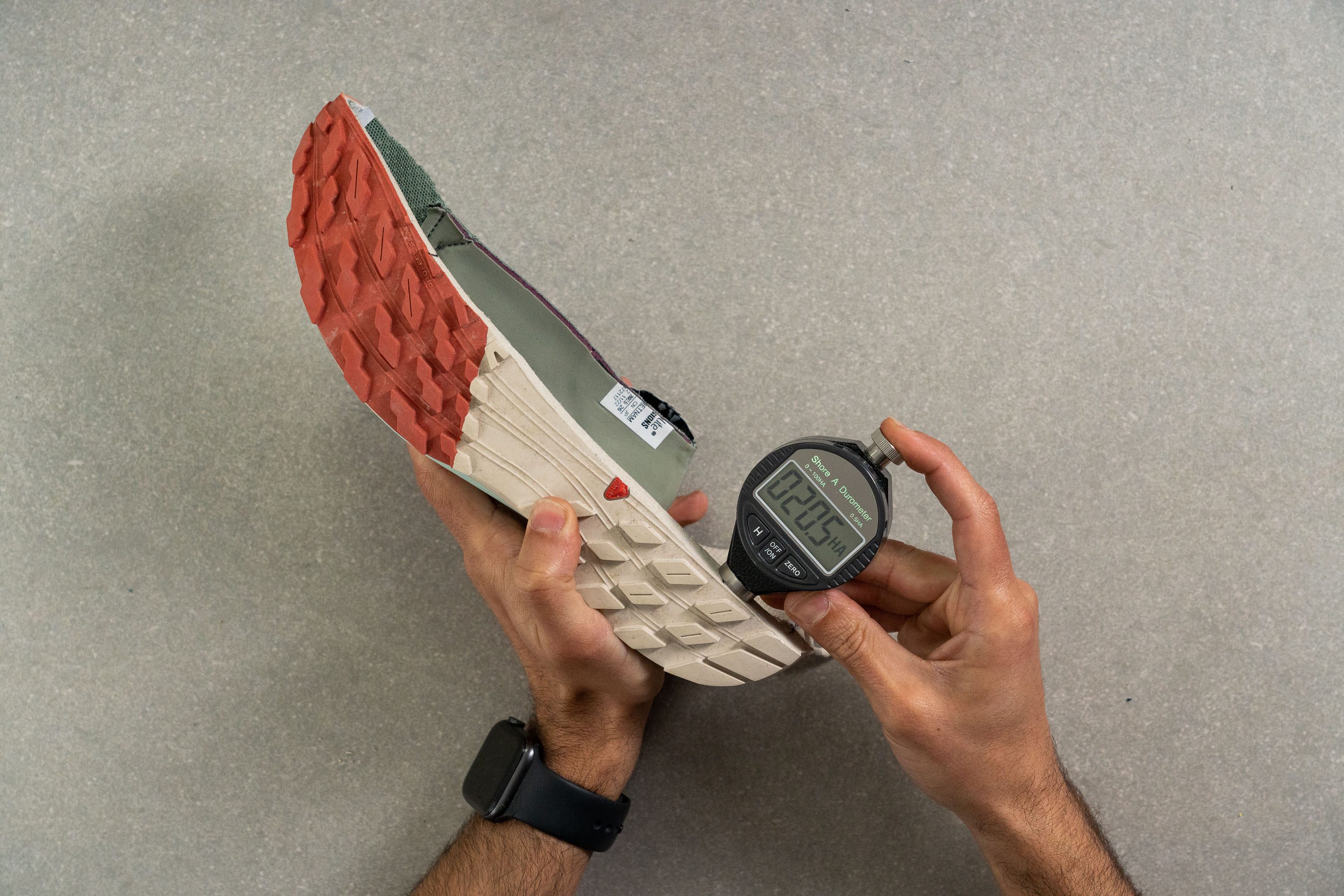
Our durometer measurement verified that you'll experience a softer-than-average shoe. In fact, the SR5 is an astonishing 63% softer than its predecessor. Yes, you read that right!
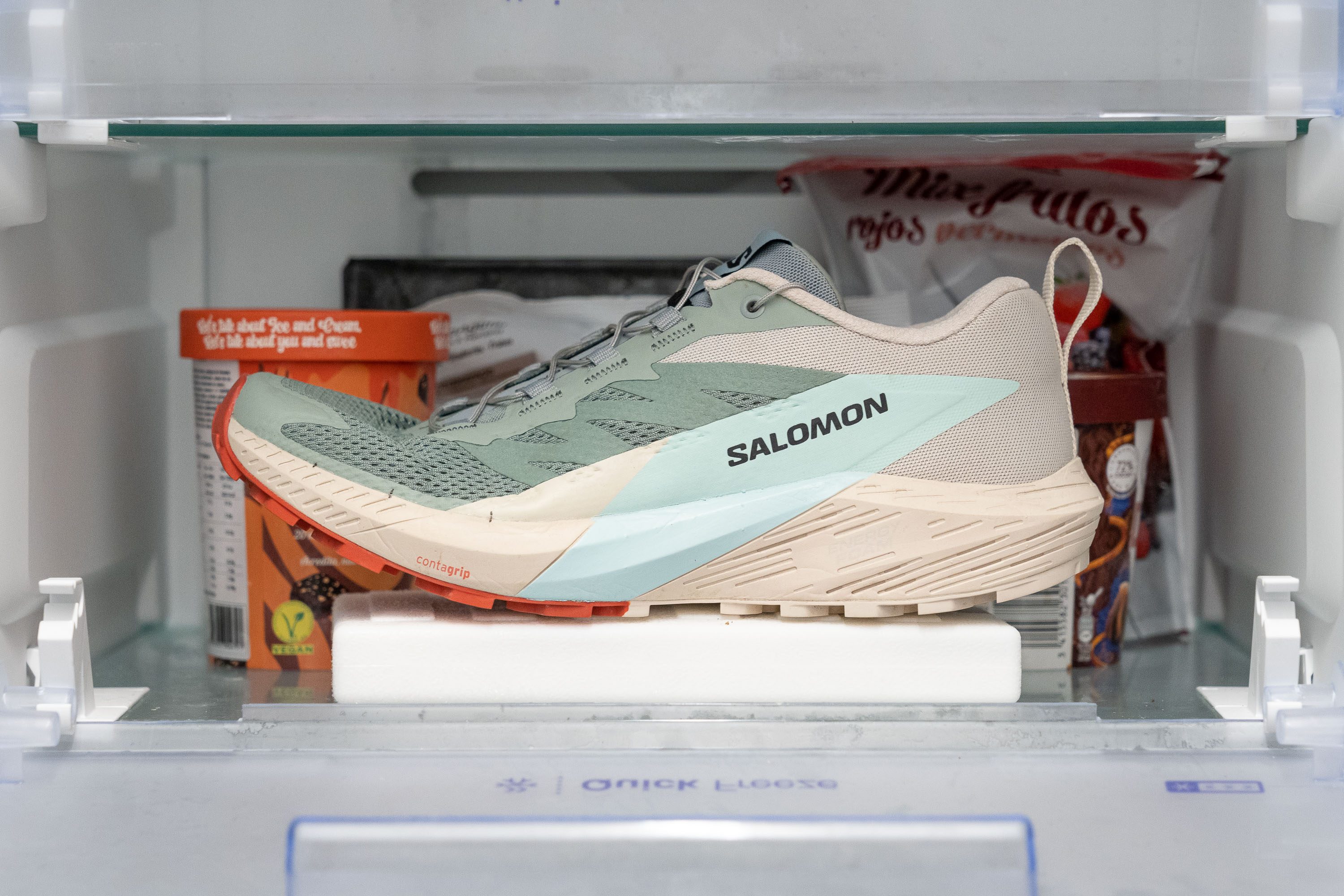
Despite being an exceptionally breathable shoe that's ideal for summer trails, it also performs superbly in winter. The EVA + OBC midsole becomes only 14.6% firmer after spending 20 minutes in our freezer, which is significantly below the 28.4% average.
In terms of flexibility, it's fantastic, with only a 19.5% increase in stiffness. This is particularly impressive when compared to the 47.6% stiffness increase in the New Balance Fresh Foam Hierro v7 or the 43.5% for trail running shoes.
Not for the toughest of trails
Thanks to its Contagrip rubber outsole, the Sense Ride 5 offers a ton of traction on light to moderate terrain. It’s especially great for road-to-trail applications and dry/slightly wet surfaces, but it can struggle a bit in the mud, slush, or hard-packed snow.
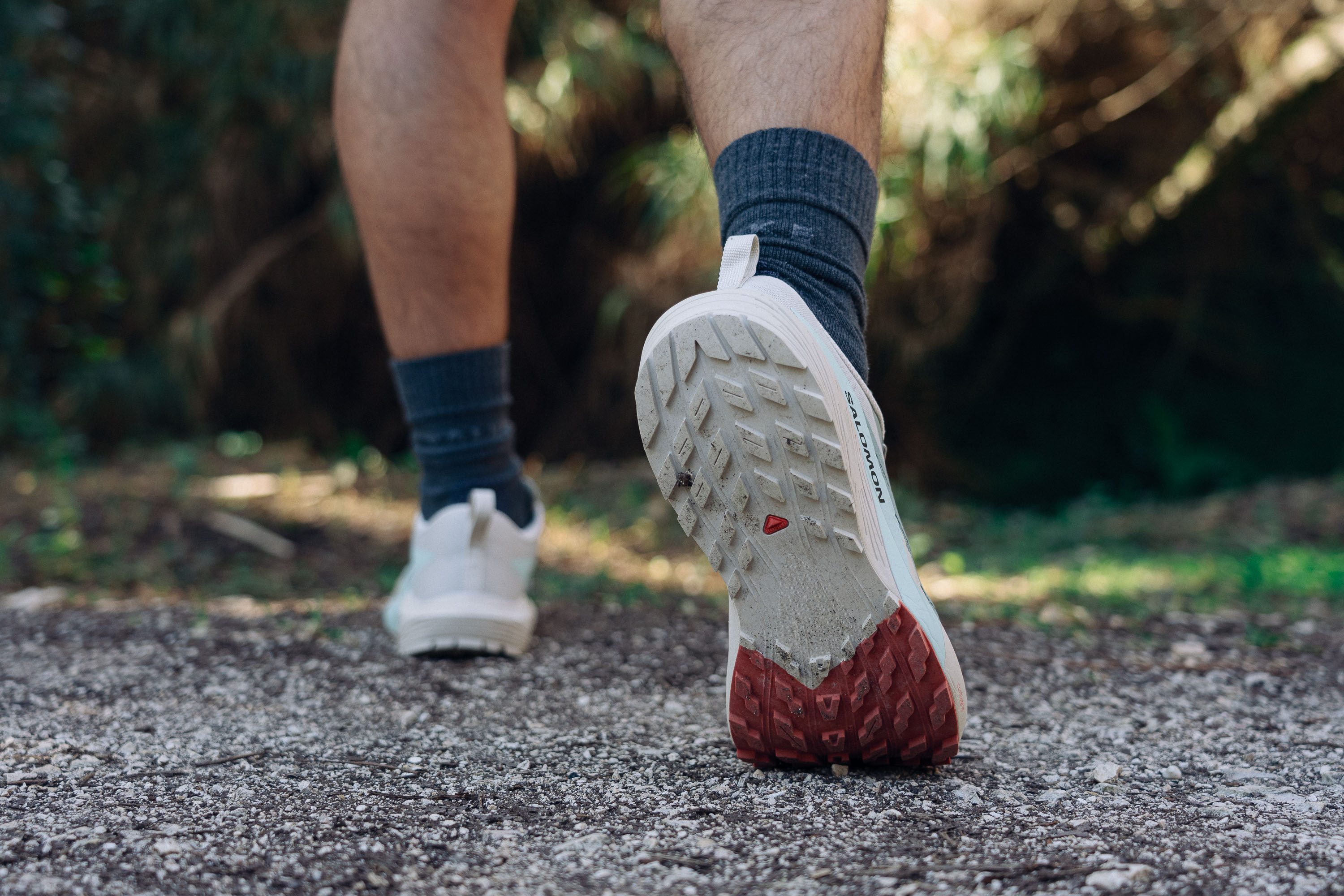
Salomon chose to use diamond-shaped lugs that measure 3.5 mm, so it's no surprise that this shoe works wonders on both easy and moderately-difficult trails but maybe not enough for the hard ones.
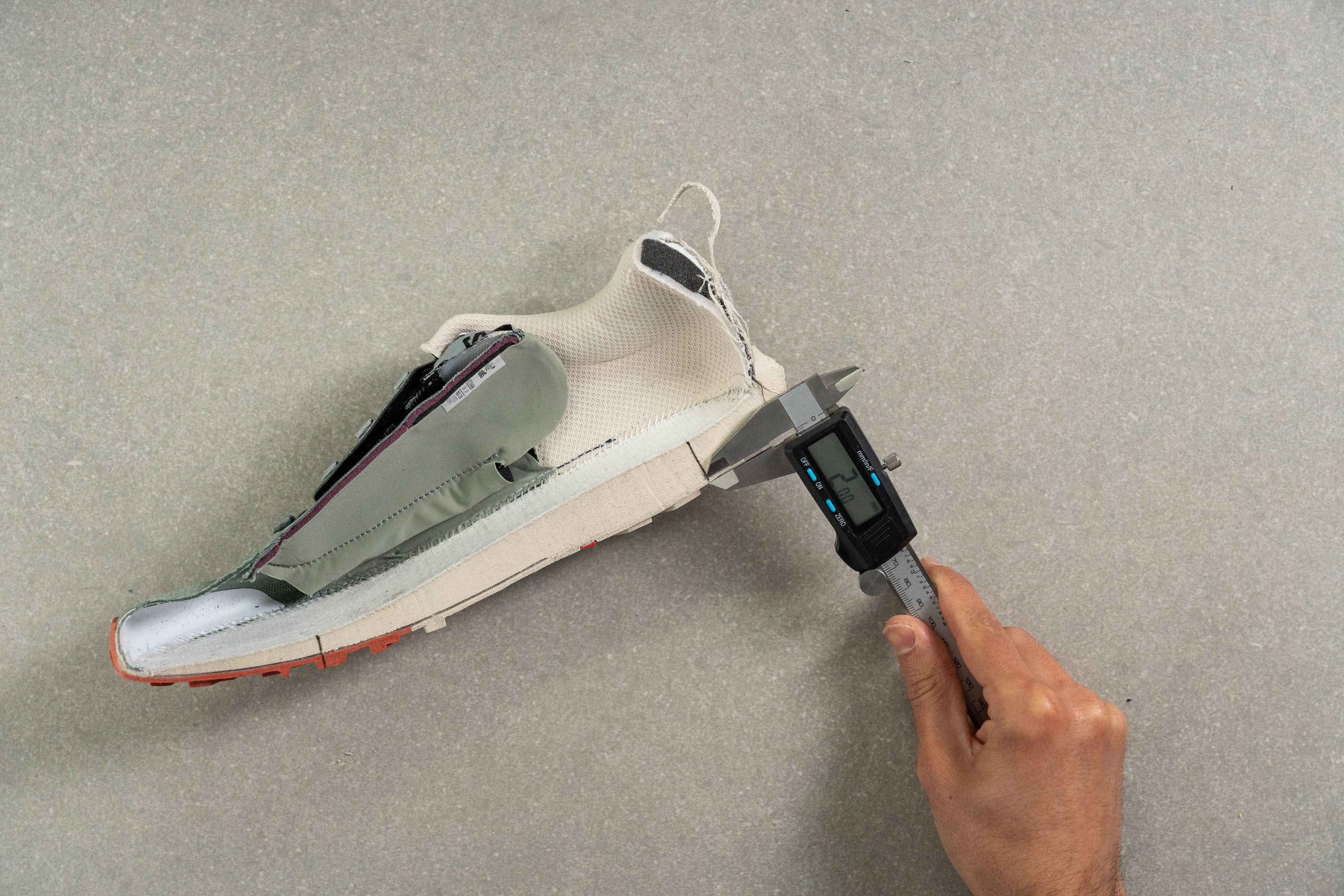
Keeping a reasonable weight is a 2.0 mm thick outsole, which is 65% less than the average trail running shoe. And due to its lack of a rock plate and thin outsole, some sharp rocks can be felt through the midsole—so it’s not particularly advisable for rocky terrain.
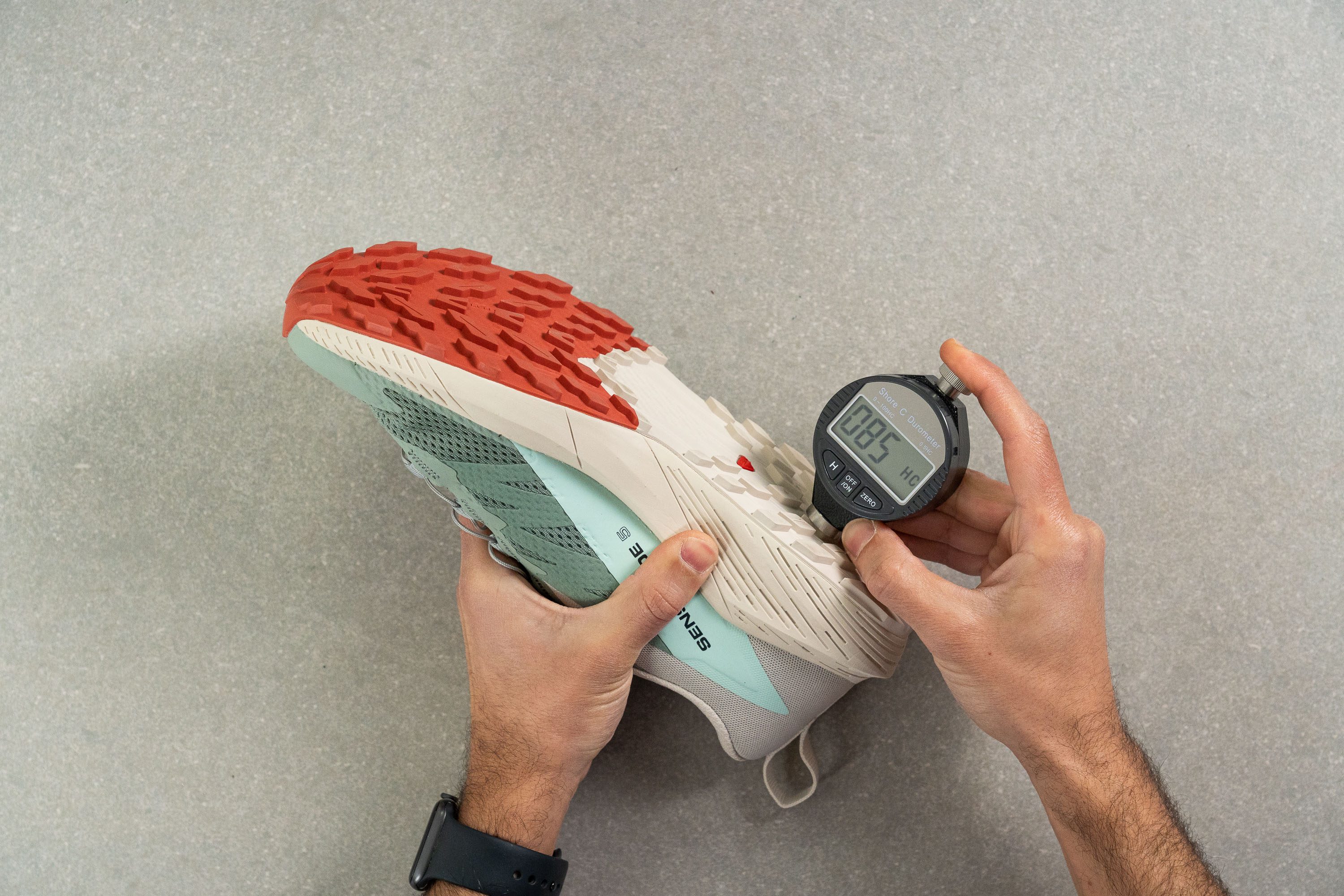
The Contagrip rubber falls within the average range when it comes to softness. The typical measurement for trail shoes is 84.9 HC, and the SR5 scored 85.4 HC, making it slightly harder. As a result, you can expect middle-of-the-roadtrail durability and grip from this outsole.
A Ride that makes Sense
We found the Sense Ride 5 to have a generally smooth, secure, and stable ride.
Though its stiff and flat-feeling forefoot somewhat limits its utility on rough, technical mountain terrains, it can still handle those stretches in a limited amount.
Even though it's not a super-fast and responsive tempo trainer, we found that it didn't really get in the way when we tried pushing the pace. It just wasn't particularly helpful in it, that's all.
Only for low-stack lovers
We are afraid that the shoe's cushioning is not going to be enough if you are a midfoot-to-forefoot striker. However, if you love low-stack racing flats, this may be your trail shoe.
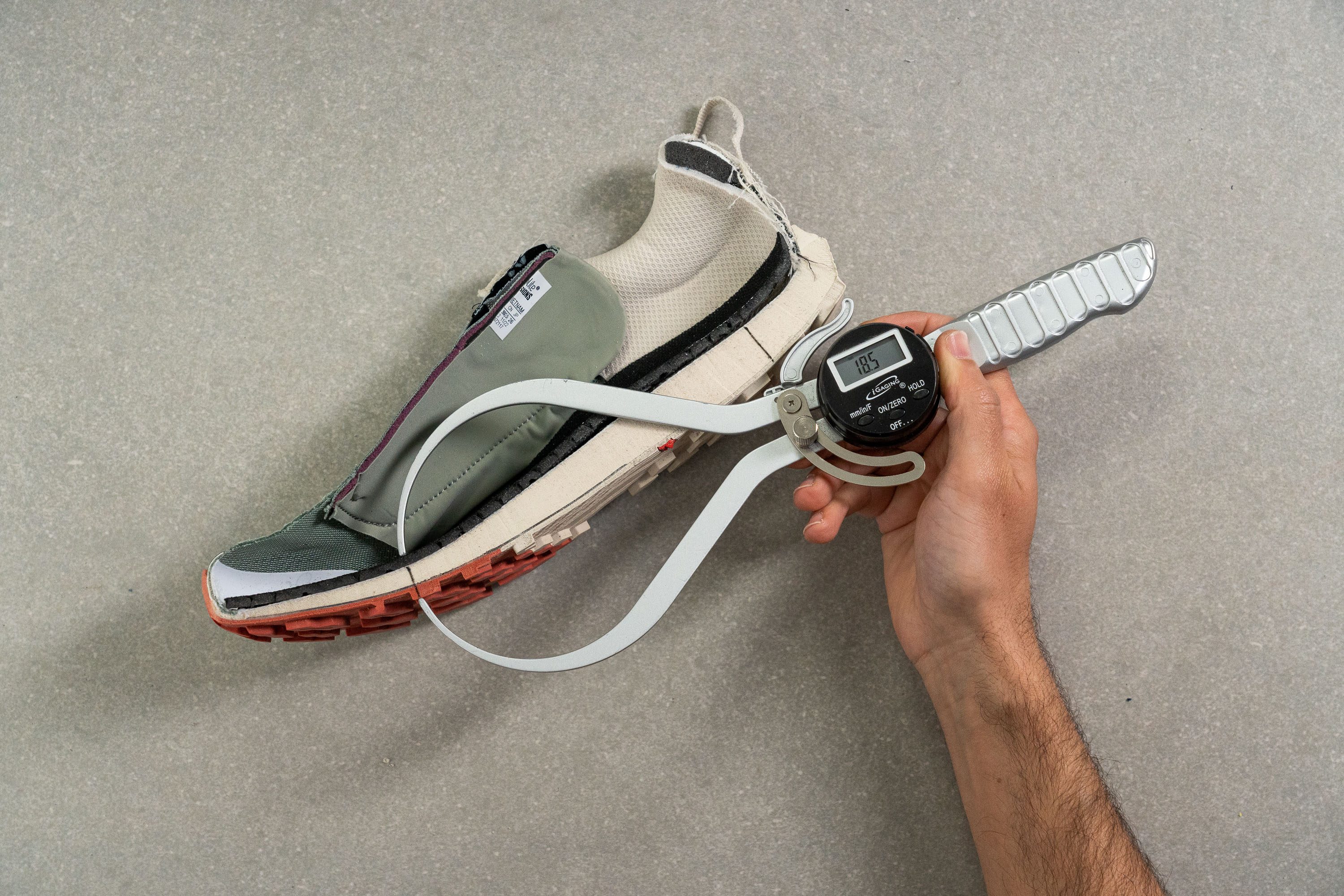
Salomon claims that this shoe has gained 4 mm of stack height compared to its predecessor. According to them, the shoe features 21.3 mm in the forefoot and 29.6 mm in the heel, resulting in an 8.3 mm drop.
However, our precise measurements show 18.5 mm in the forefoot and 27.2 mm in the heel, so it's less than advertised.
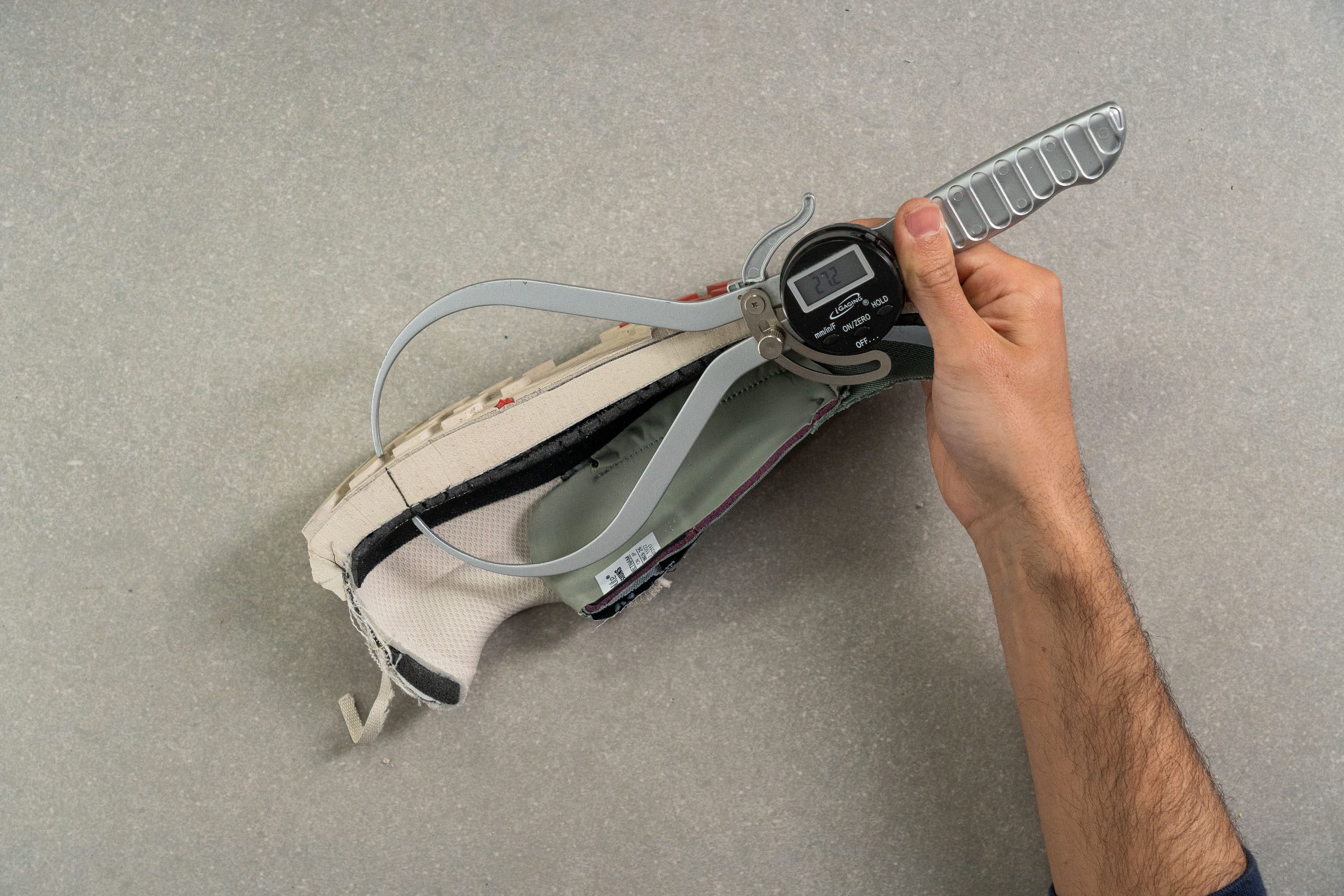
The 8.3 mm heel-to-toe drop on the Sense Ride may not be suitable for fans of low-drop trail shoes.
Toe box space is in short supply but nice-and-secure platform
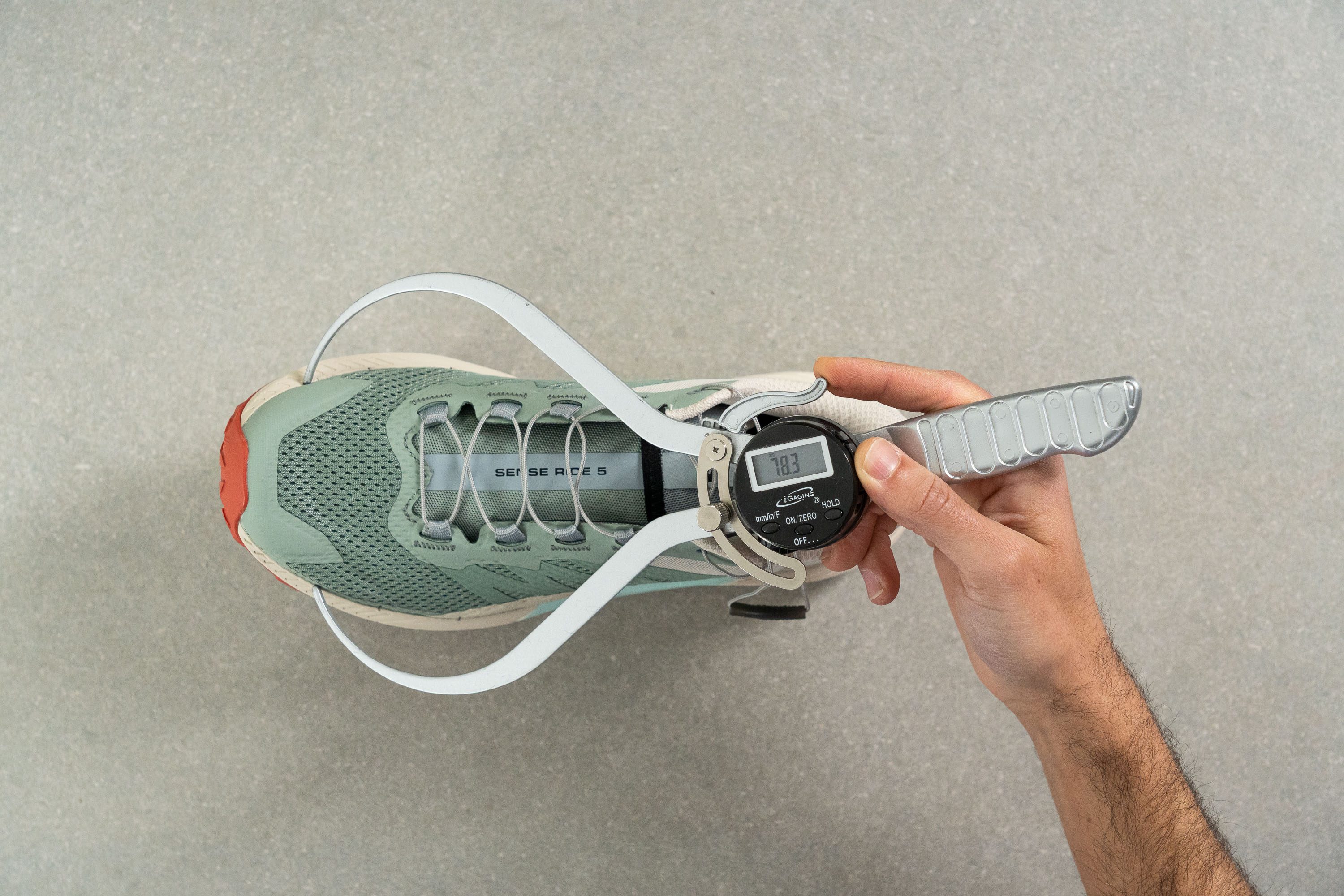
We noticed that the Sense Ride 5 has gotten clearly narrower and less roomy in the forefoot compared to the v4. Because of this, we recommend going up half a size to make the fit work.
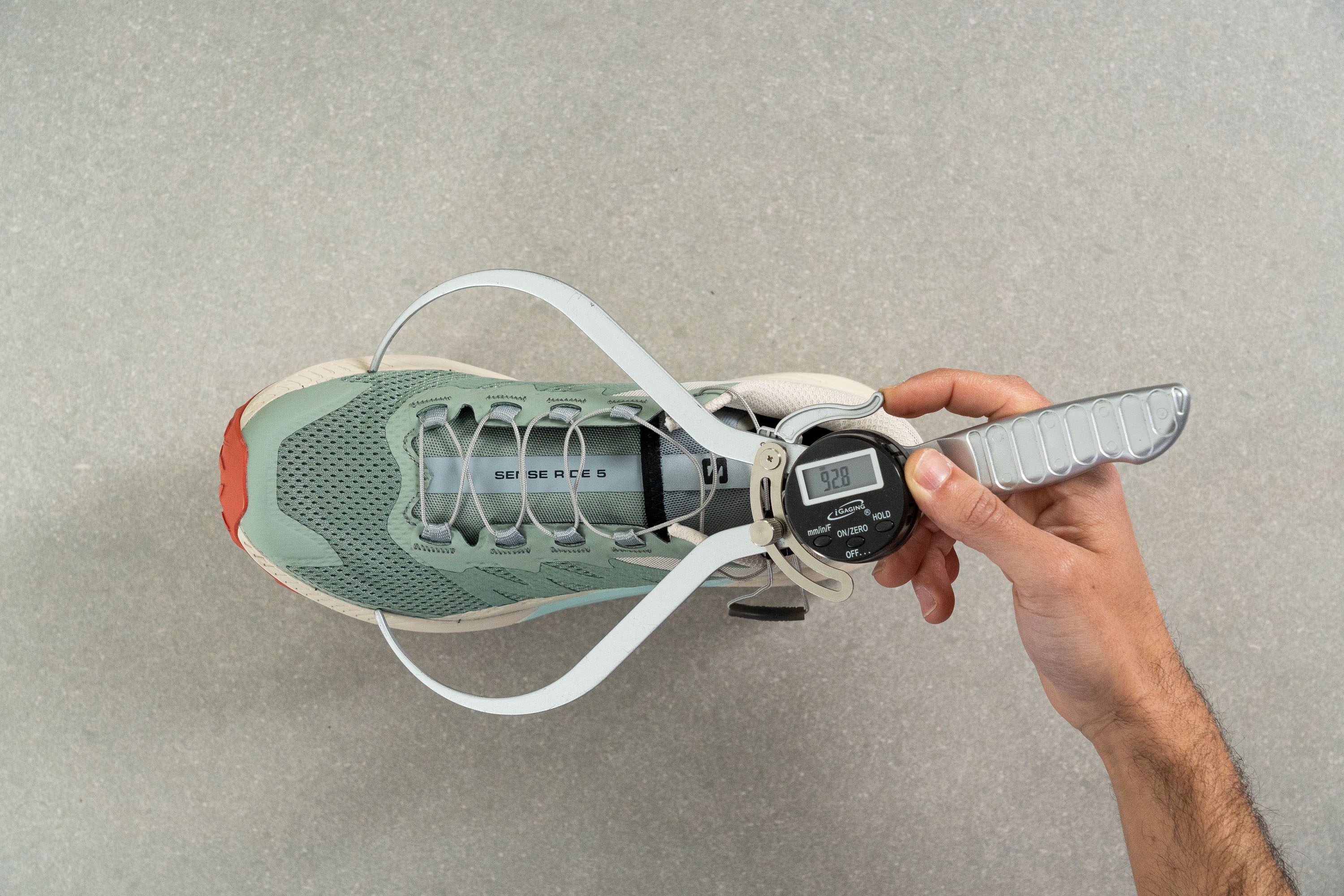
Upon closely comparing both Sense Ride models, we can confirm that the v5 is indeed smaller than the v4. At its widest point, the newer version is 2.3 mm or 1% smaller. Although this may not appear significant, it makes a difference.
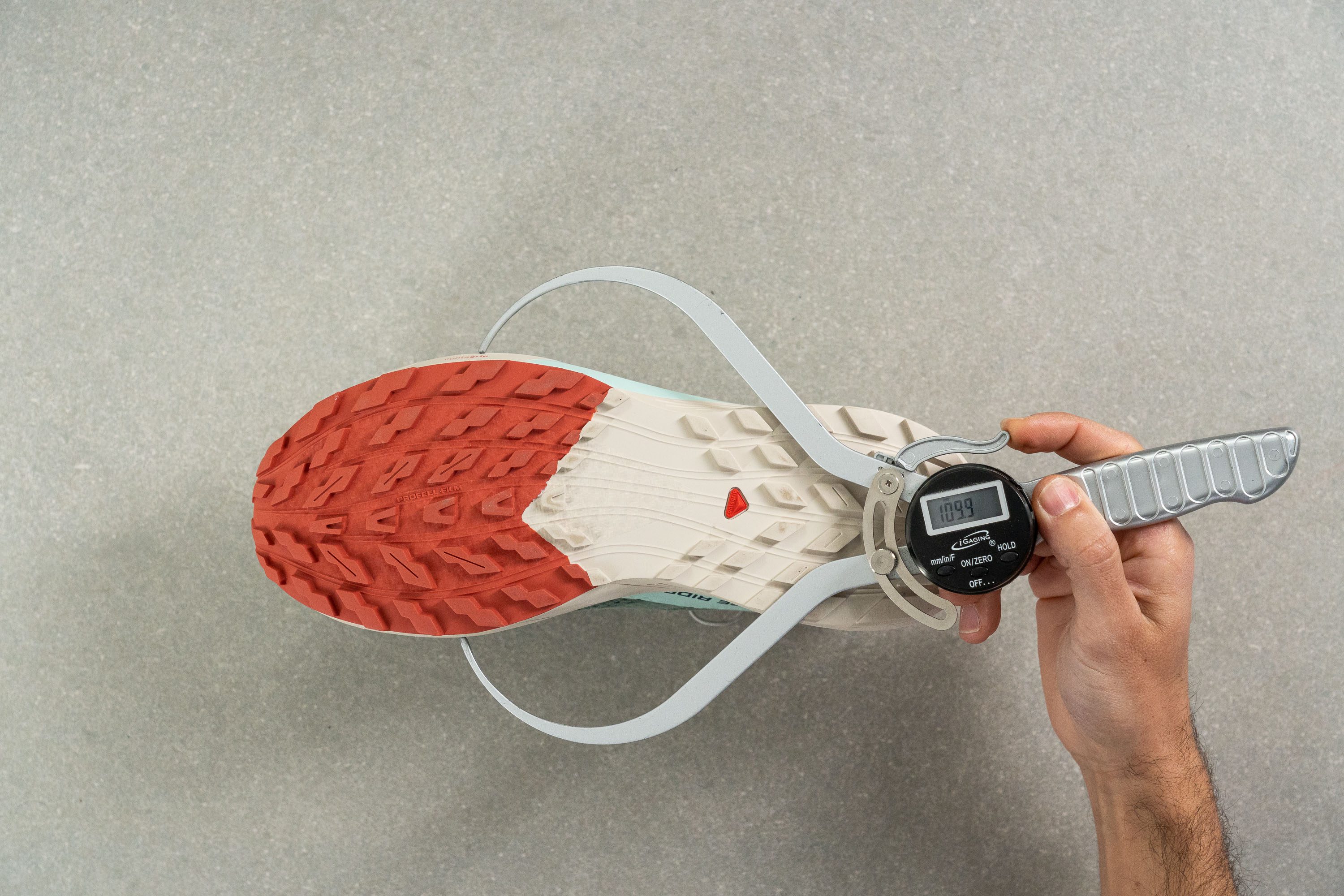
Our lab measurements validate that the Sense Ride 5 boasts a wide enough platform for most runners. For example, when compared to its competitor, the Altra Lone Peak 7, it's 3% wider in the forefoot and an impressive 6% wider in the heel, making it a more appealing shoe for runners with stability concerns.
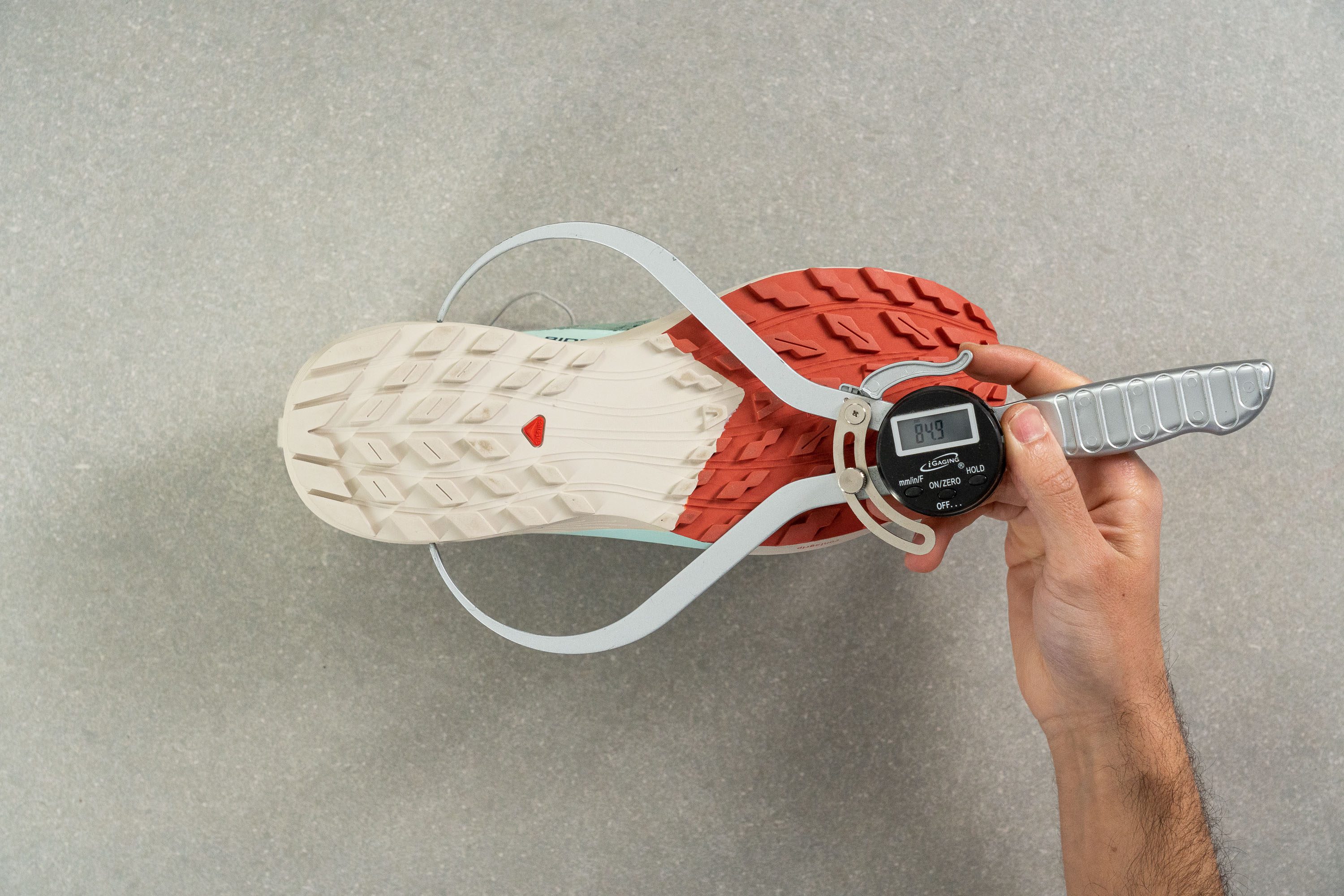
Lockdown is just one pull away
Topping off the Sense Ride v5’s solid foothold is its Quicklace system, which goes all the way down to the forefoot and does a terrific job of locking down everything.
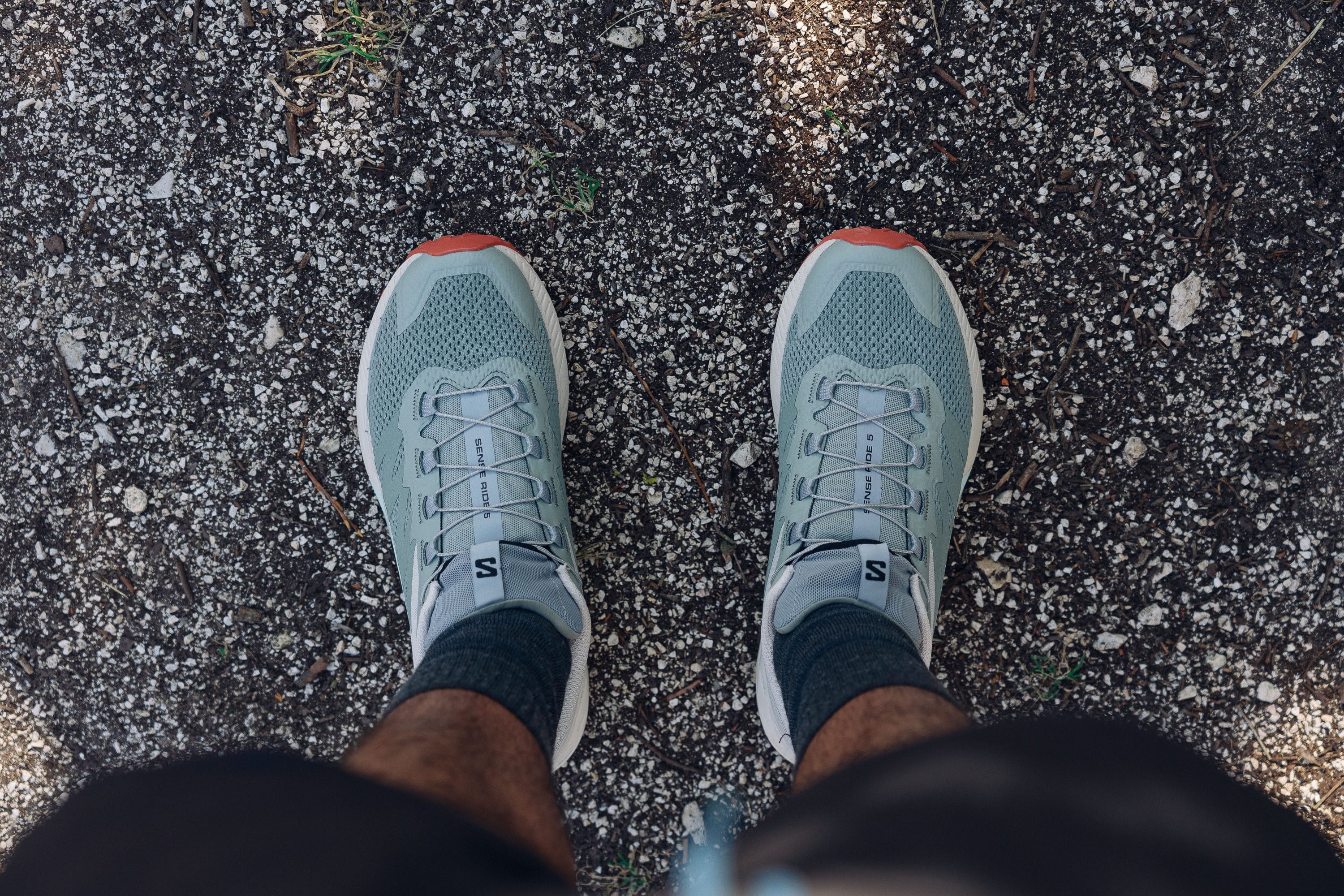
The lace garage was a real gem as it allowed us to keep the excess laces from flopping around.

Regarding the tongue of the shoe, it's designed just as it should be: gusseted. It is connected to the sides to prevent any debris or rocks from entering the shoe.
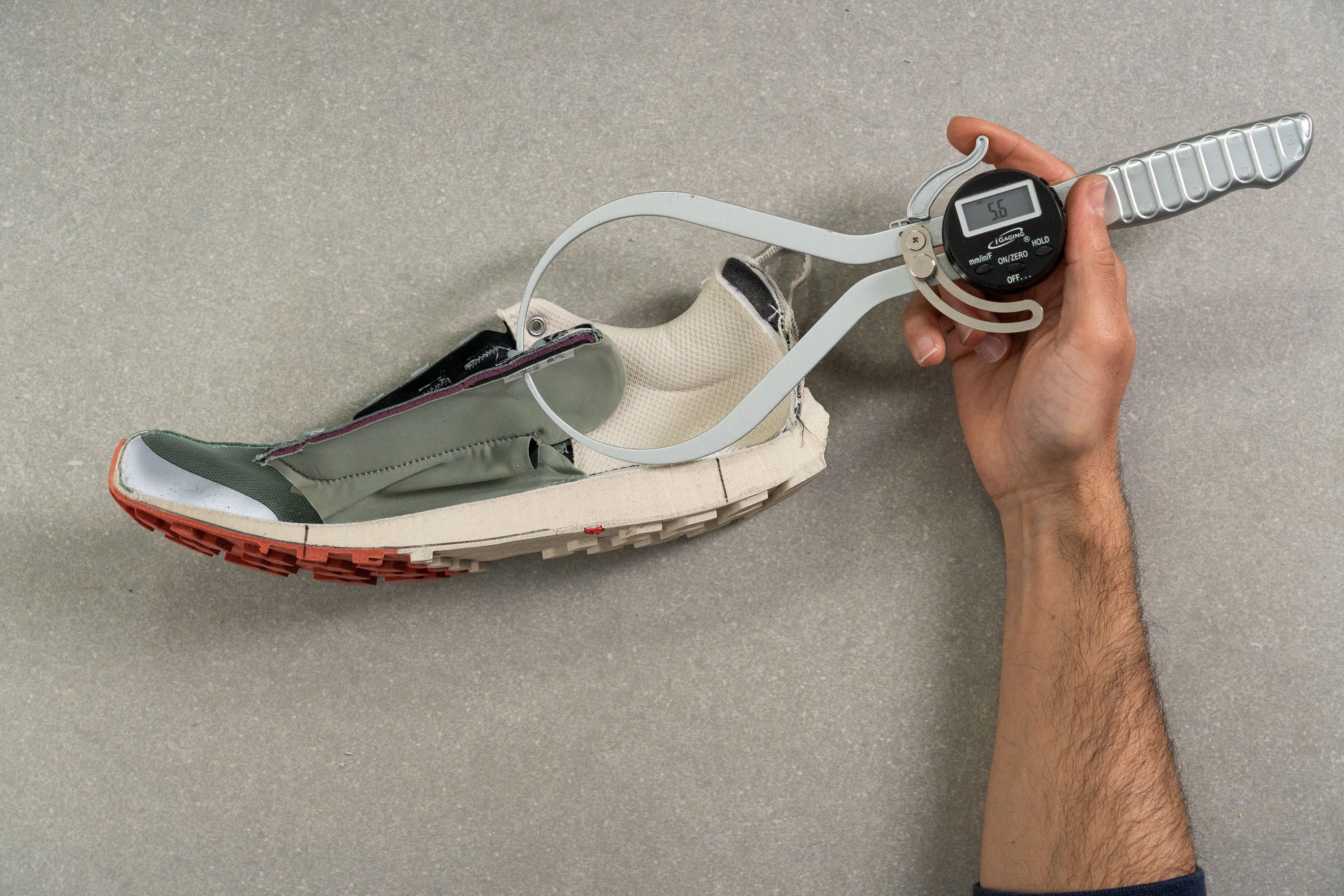
We also appreciated the tongue with its state-of-the-art thick 5.6-mm padding. You can say goodbye to lace bite. This enhancement is a notable upgrade from the v4, which was a considerable 25% thinner.
Two is better than one
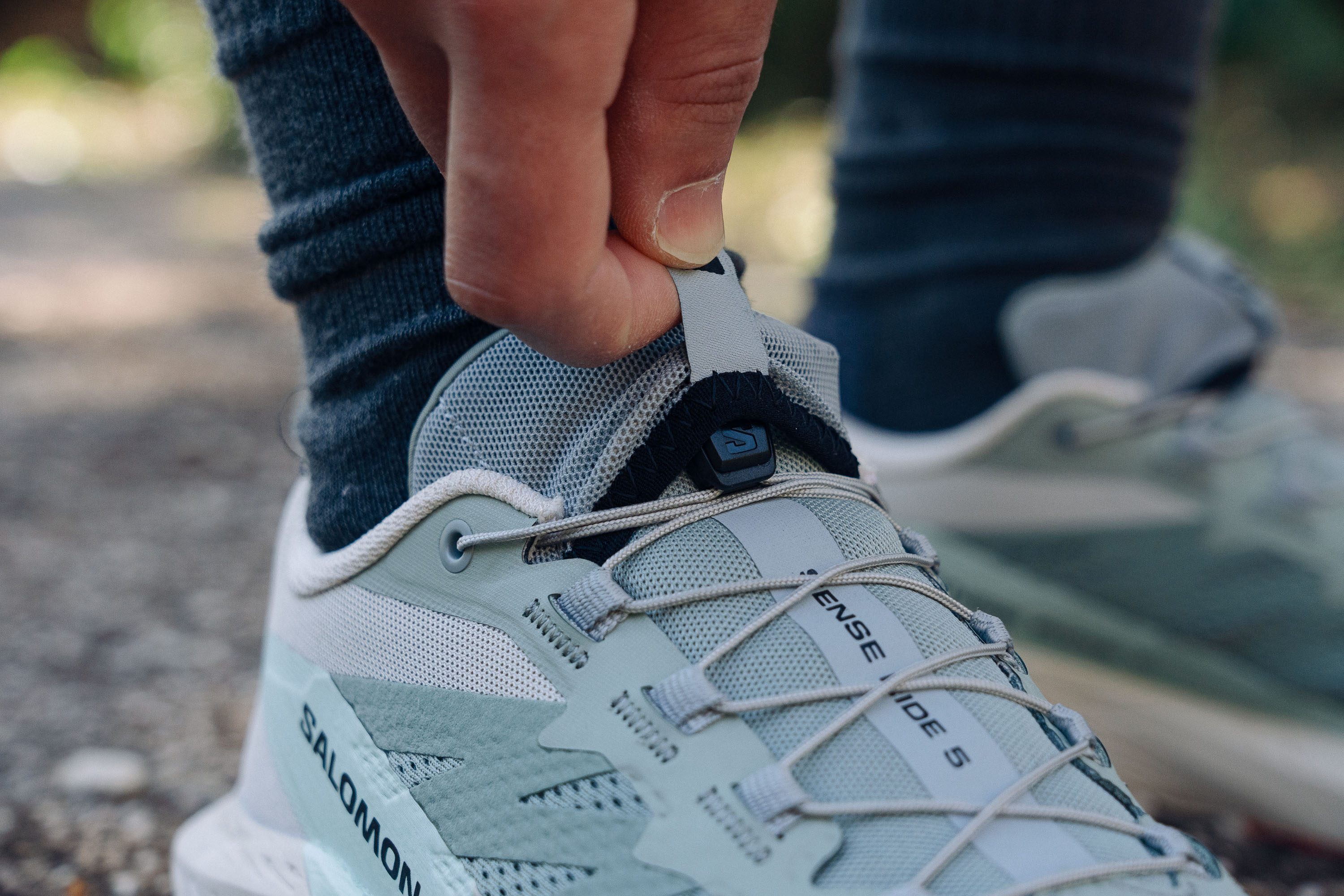
Are you a fan of pull tabs? Salomon seems to know how good they are for slipping on shoes and has pleasantly surprised us with not just one, but two pull tabs. You'll find one on the heel and another on the tongue. Love it!
